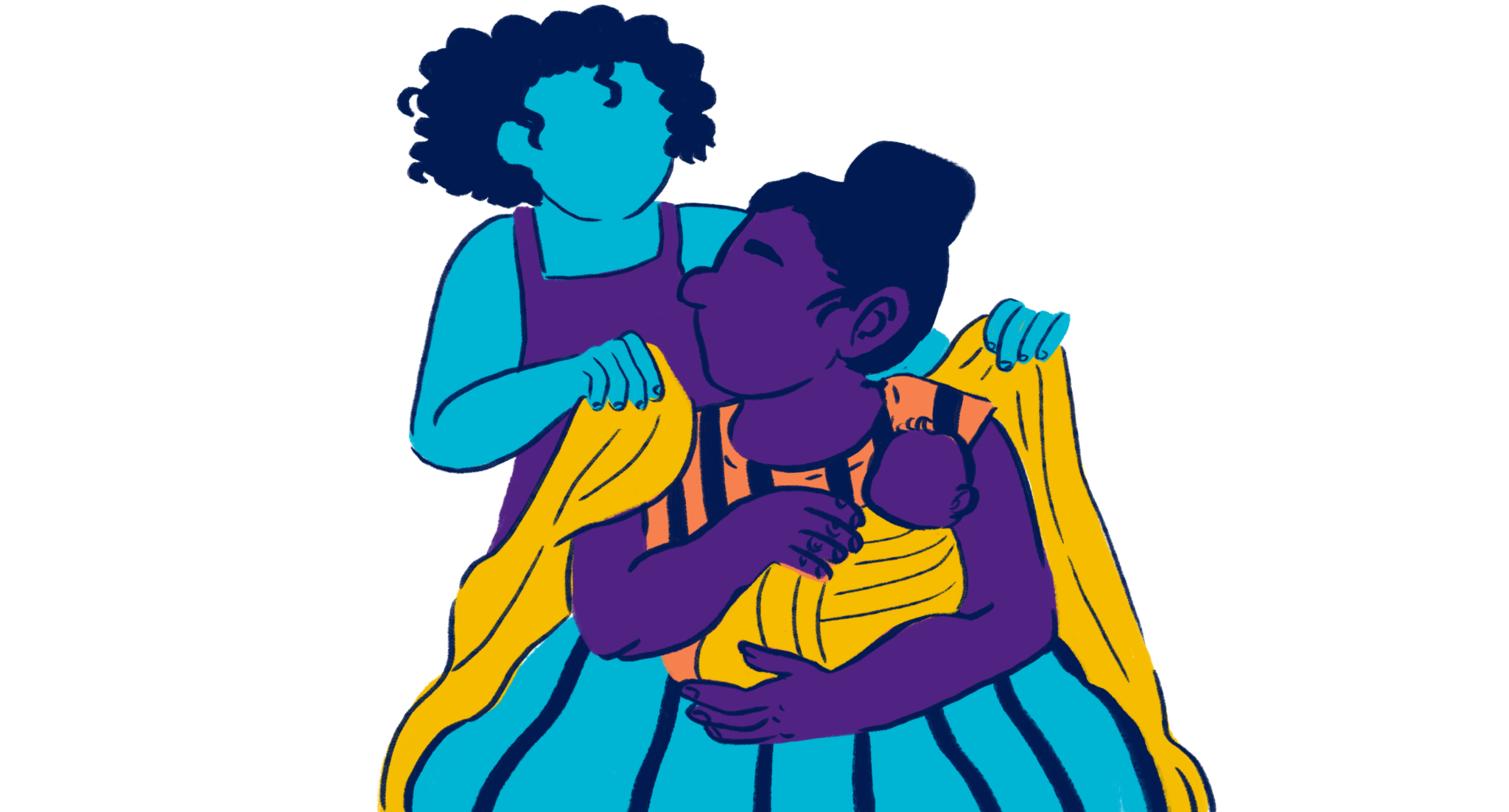Veronica Daniels has been incarcerated more than once, but she couldn’t have envisioned the challenges that this latest stint would bring. Daniels, who’s thirty-nine, was in prison with Elyiah, her newborn baby; the COVID-19 pandemic was spreading rapidly, and Daniels and Elyiah had a heightened vulnerability to the disease.
Then, on March 20, as COVID-19 cases began appearing in prisons, the Illinois Department of Corrections released Daniels and Elyiah from the Decatur Correctional Center’s Moms and Babies program. Daniels was put on electronic home detention, an arrangement similar to house arrest, in her mother-in-law’s house in Mount Prospect.
Had Daniels not been imprisoned with her child, she would probably still be incarcerated today; the Department of Corrections prioritized mothers and children for early release from prison amid the COVID-19 pandemic. But not every mom gets to keep her child in prison. For Daniels, it took the help of Aly Anderson, a doula and drug and alcohol counselor for Catholic Charities’ Jadonal E. Ford Center’s Pregnant and Parenting Women with Opioid Use Disorder (PPW-OUD) program in Roseland, to make it happen. As a doula, Anderson provides medical and emotional support to pregnant people and their babies before and after childbirth.
Daniels met Anderson when Anderson was visiting program participants at the Cook County Jail, where Daniels was housed in January 2020. Initially, Daniels was reluctant to join the program. “I wasn’t easily persuaded,” Daniels said. “I thought possibly that I was going to be going to prison and not be able to keep my baby. I think I was in jail for three months before I reached out.”
Daniels finally joined the program in October 2019. And it worked in her favor: Anderson helped facilitate Daniels’ transfer to the Decatur Correctional Center’s Moms and Babies program, where she gave birth to Elyiah in February and maintained her custody.
Anderson and her co-workers assist Daniels and other program participants, most of whom are dealing with opioid addictions. Unlike most participants, Daniels hasn’t used opiates in four years; Daniels said her latest addiction was to cocaine and benzodiazepines.
Daniels’ recovery from opiate abuse marks her as a survivor of a drug that caused 46,802 fatal overdoses nationwide in 2018, more deaths than any recorded year besides 2017, according to the National Institute on Drug Abuse. Daniels’ recovery helped Elyiah, too.
In Illinois, 2.5 of every 1,000 babies born in 2018 were born with neonatal abstinence syndrome (NAS), a drug withdrawal syndrome, according to the Agency for Healthcare Research and Quality. NAS is associated with poor fetal growth and preterm birth, and can cause seizures, excessive irritability, poor feeding, and dehydration, according to the Illinois Department of Public Health.
Around eighty percent of the Ford Center’s PPW-OUD program participants’ babies are born with NAS, and many require methadone treatment to mitigate withdrawal symptoms, said Anderson. Because Daniels stopped using opiates in 2016, Elyiah didn’t have NAS.
No matter the mother, the PPW-OUD program’s structure follows a template. “The moms come to me at some point in their pregnancy—anything from six weeks pregnant to term,” Anderson said. “We work in tandem with OB-GYNs to create a birth plan, then we work with each mom until their baby is one year old.” Each case’s details, though, are more complex. Anderson said many participants deal with personal trauma, substance use, a partner’s substance use, domestic violence, custody battles, housing issues, and ongoing court cases.
Accordingly, Anderson’s most critical skill in her work is compassion. “People often look at women who use drugs negatively, and the women don’t feel respected,” Anderson said. “So giving them basic human decency and respect goes a long way.”
Given each case’s complexities, Anderson is careful not to overstep a participant’s boundaries. “For me, I don’t want to give them the end goal,” Anderson said. Instead, the participant creates goals, and Anderson makes sure they’re viable and safe. “We have a care plan for their recovery,” Anderson said, “and then a care plan for their overall health and their baby’s health.”
Initially, Daniels found it challenging to envision a goal. “Sometimes it’s hard when you haven’t set goals in a long time, to actually reach in and find those things, like what it is that you actually want,” Daniels said.
Then, she gave birth to Elyiah, and her goals became clear. “I want to be a healthy mom for her,” Daniels said.
But Daniels’ vision extends beyond Elyiah. “I have other children that I don’t have custody of due to my drug addiction, so she’s a chance at redemption for me,” she said. “And I get to try to do it differently this time and bring my other children in our lives when I get myself strong enough, so I know I won’t let them down.”
Central to Daniels’ vision is the bond between her and Elyiah. “I have a strong love for myself that I want to kind of nurture and help myself grow,” she said. “And I want Elyiah to love herself, so I have to show her those things.”
Elyiah is currently eight months old, and Daniels hasn’t used drugs in thirteen months. Until her release from electronic detention on March 26, 2021, she can only leave her mother-in-law’s house for approved shopping trips and socially distant visits with Anderson. She can’t work.
But Daniels is looking forward to freedom, work, and motherhood. “I can’t wait to get a job and go to work and come home and see the look on my baby’s face, so I know she’s excited to see me and happy I’m home.”
For more information on the Jadonal E. Ford Center call (773) 474-7264.
Alex Shur is a journalist focused on social services, immigration, the opioid epidemic and social justice issues. Alex is currently pursuing an M.S. in Journalism from Northwestern University. This is his first piece for the Weekly.


Absolutely beautiful article.
This was very insightful on reform as well how it effects us a whole
Beautiful article